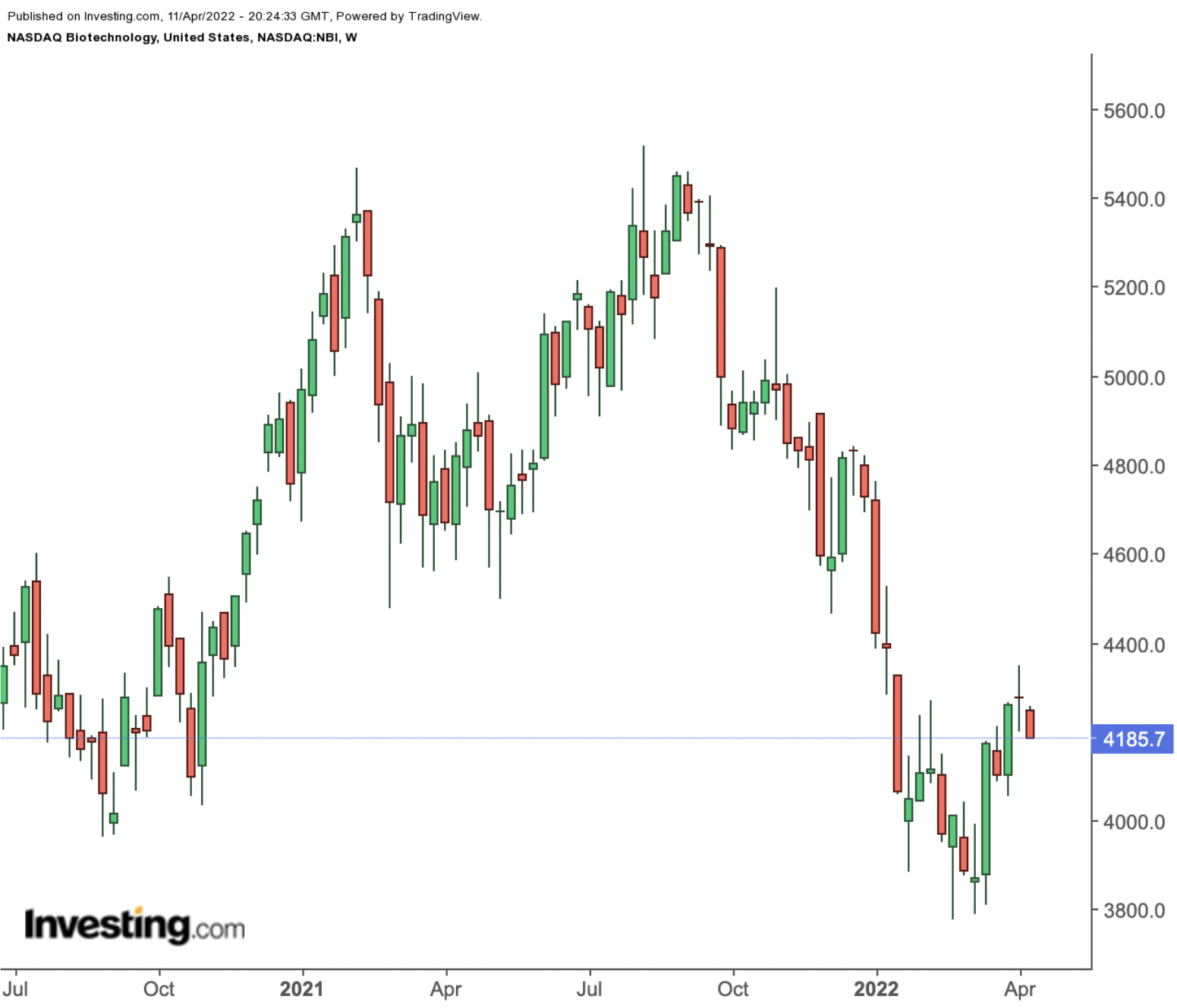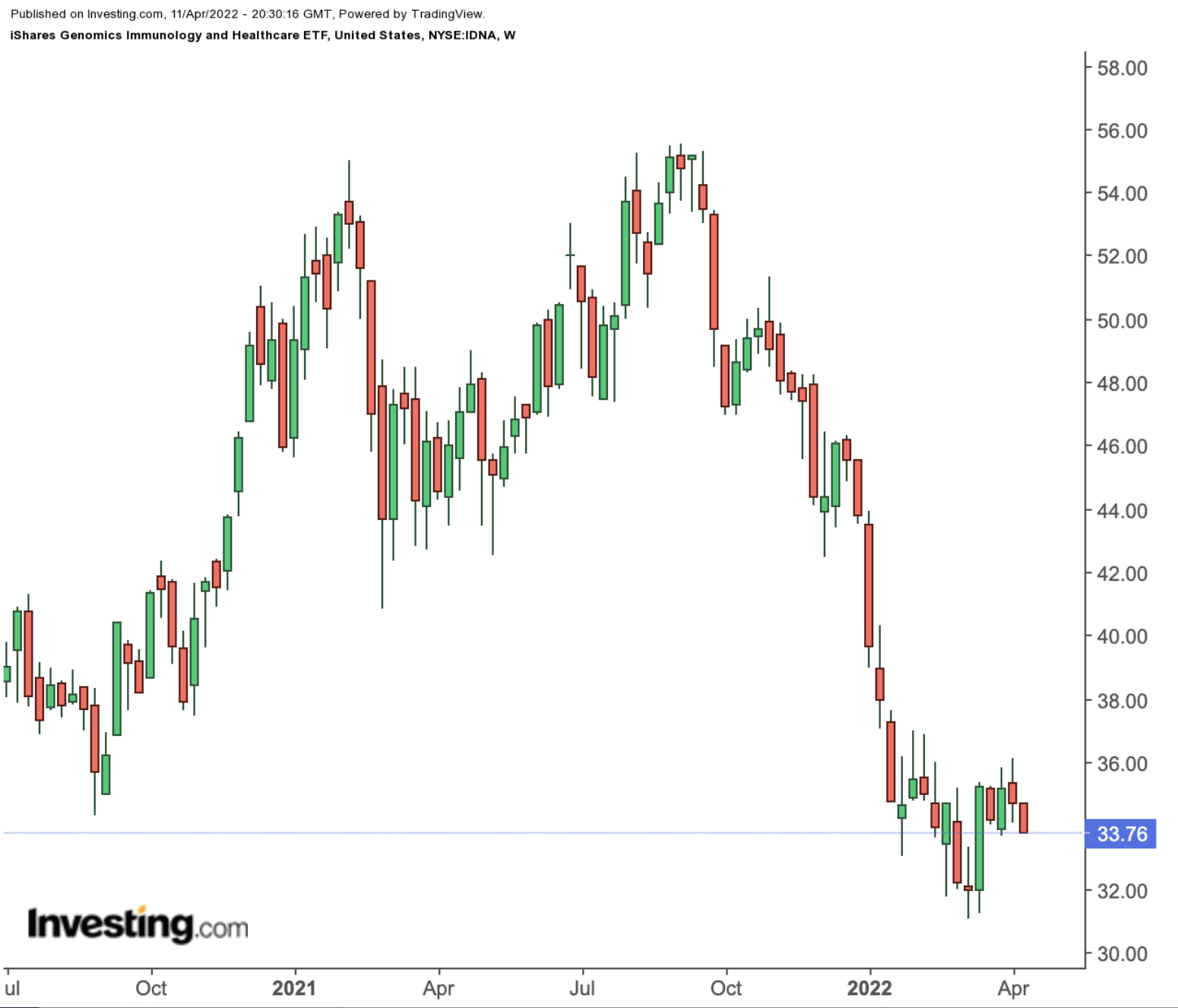Biotechnology stocks represent companies that research, develop or market healthcare-related therapies or products. They typically use living organisms, biological systems, or derivatives.
With a market value of about $800 billion in 2021, the global biotech industry impacts a variety of segments, such as genomics, medicine, pharmaceuticals, agriculture, and food. Expectations are that the biotech market will double in the next 10 years.
Such growth prospects mean Wall Street pays close attention to biotech shares. Yet, despite rosy prospects, biotech stocks are rarely “safe” investments. Failures during the development stage are common. In fact, only a few biotech companies have become successful enough to generate recurring revenue. Most names lack revenue altogether.
Share prices of biotech names are also volatile. For example, approvals of applications by the US Food and Drug Administration (FDA) can propel a double-digit jump in hours. On the other hand, if trial data does not produce satisfactory results, biotech names can lose significant value overnight.
In the past 12 months, the NASDAQ Biotechnology Index lost 10.4%. Meanwhile, the S&P 500 and NASDAQ 100 returned about 6.8% and 1% respectively.

As a result, contrarian investors could regard such a decline in biotech stocks as a good opportunity to buy into the sector.
Examples of Biotech Stocks
The InvestingPro website introduces different types of biotech stocks (here, here, and here). For starters, if we look at businesses by market capitalization (cap), among large caps are biopharma heavyweights Abbott Laboratories (NYSE:ABT) and Bristol-Myers Squibb (NYSE:BMY); Seagen (NASDAQ:SGEN), which focuses on cancer therapies; and Israel-based Teva Pharmaceutical (NYSE:TEVA).
Readers who pay attention to Wall Street price targets might want to know that several biotech stocks could potentially see a significant upside from current price levels. Examples include Abbott Laboratories; Ireland-based generics specialist Endo International (NASDAQ:ENDP); cancer-focused testing laboratory group NeoGenomics (NASDAQ:NEO); cancer research firm MacroGenics (NASDAQ:MGNX); and Israel-based Taro Pharmaceutical Industries (NYSE:TARO).
In terms of the most undervalued stocks in this segment, we see the radiation treatment company Accuray (NASDAQ:ARAY); biopharma heavyweight Biogen (NASDAQ:BIIB); FibroGen (NASDAQ:FGEN), which specializes in cancer drugs; and Indian generic-drugs company Dr. Reddy’s Laboratories (NYSE:RDY).
Shares of high-growth biotech stocks typically command a premium. Several names to focus on would be the cancer diagnostics company Exact Sciences (NASDAQ:EXAS); the widely-followed biotech name Regeneron Pharmaceuticals (NASDAQ:REGN); life-sciences group Repligen (NASDAQ:RGEN); and clinical-stage biopharma firm Xencor (NASDAQ:XNCR).
Finally, passive income investors would be interested to know that biopharmaceutical therapies developer Gilead Sciences (NASDAQ:GILD) currently boasts a 4.8% dividend yield, while human therapeutics company Amgen (NASDAQ:AMGN) supports a hefty dividend yielding 3.1%.
Understandably, picking biotech shares that match individual portfolio objectives requires a fair amount of due diligence. Retail investors may also consider investing in an exchange-traded fund (ETF) that provides broader exposure to the biotech industry, a topic we regularly cover.
Among the funds we previously looked at were:
- First Trust NYSE Arca Biotechnology Index Fund (NYSE:FBT)—down 6.3% YTD;
- SPDR S&P Biotech ETF (NYSE:XBI)—down 22% YTD;
- VanEck Biotech ETF (NASDAQ:BBH)—down 13.6% YTD;
- Virtus LifeSci Biotech Products ETF (NYSE:BBP)—down 11.3% YTD.
Today’s article builds upon our earlier discussions and introduces another ETF that could appeal to investors looking for exposure to biotech names.
iShares Genomics Immunology and Healthcare ETF
- Current Price: $33.76
- 52-week range: $31.03 - $55.55
- Dividend yield: 0.90%
- Expense ratio: 0.47% per year
The iShares Genomics Immunology and Healthcare ETF (NYSE:IDNA), invests in global names that are likely to benefit from the long-term growth and innovation in genomics, immunology, and bioengineering. Many of these stocks are at the center of critical research and development. The fund started trading in June 2019.

IDNA, which tracks NYSE FactSet Global Genomics and Immuno Biopharma Index, currently has 50 holdings. The top 10 stocks in the portfolio account for over half of net assets of $235.7 million.
Around two-thirds of these names come from the US. Next in line are companies from Germany, Japan, France, Denmark, and Switzerland.
Leading holdings include Exelixis (NASDAQ:EXEL), Sanofi (PA:SASY) (NASDAQ:SNY), Regeneron Pharmaceuticals, Ono Pharmaceutical (OTC:OPHLY), and Takeda Pharmaceutical (NYSE:TAK).
The ETF is down to 22.9% this year and 24.2% in the past 12 months. P/E and P/B ratios stand at 15.41x and 3.05x. Interested readers could find value in IDNA around current levels.
